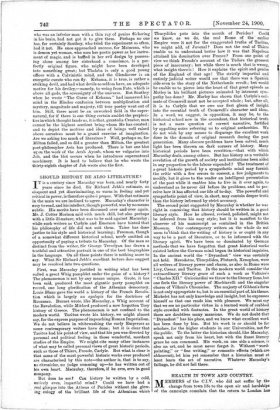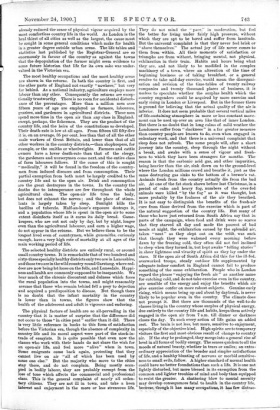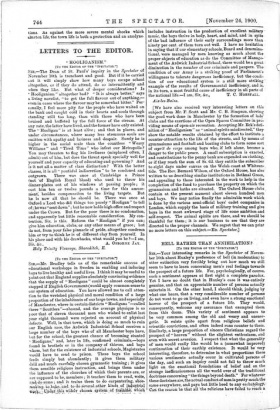HEALTH IN TOWN AND COUNTRY.
iur EMBERS of the C.I.V. who did not suffer by the 1,J_ change from town life to the open air and hardships of the campaign complain that the return to London has
already reduced the sense of physical vigour acquired by the most comfortless country life in the world. As London is the heal thiest of all cities as well as the largest, the cause must be sought in some general conditions which make for health in a greater degree outside urban areas. The life tables and statistics last published by the Registrar-General are so enormously in favour of the country as against the towns that the depopulation of the former might seem evidence to some future historian that life for its own sake was under- valued in the Victorian era. already reduced the sense of physical vigour acquired by the most comfortless country life in the world. As London is the heal thiest of all cities as well as the largest, the cause must be sought in some general conditions which make for health in a greater degree outside urban areas. The life tables and statistics last published by the Registrar-General are so enormously in favour of the country as against the towns that the depopulation of the former might seem evidence to some future historian that life for its own sake was under- valued in the Victorian era.
The most healthy occupations and the most healthy areas are shown in the returns. In both the country is first, and the other parts of England not exactly "nowhere," but very far behind. As a national industry, agriculture employs more labour than any other. Consequently the returns are excep- tionally trustworthy. There is no room for accidental disturb- ance of the percentages. More than a million men over fifteen years of age are employed as farmers, labourers, graziers, and gardeners in agricultural districts. These men spend more time in the open air than any class in England, except, perhaps, the fishermen. They are the product of the country life, and the heirs of the constitutions so developed. Their death-rate is low at all ages. From fifteen till fifty-five it is, on an average, 35 per cent, less than that of all the other male workers of Great Britain, and lower than that of all other workers in the country districts,—than shopkeepers, for example, or the smiths or wheelwrights. Farmers and cattle owners have a lower death-rate than that of the clergy, the gardeners and nurserymen come next, and the entire class of farm labourers follows. If the cause of this is sought "medically," it will be found in the freedom of the country- men from induced diseases and from consumption. Their partial exemption from both must be largely credited to the country life and to the open air. Drink and consumption are the great destroyers in the towns. In the country the deaths due to intemperance are few throughout the whole agricultural class. The open-air life tires the body, but does not exhaust the nerves ; and the place of stimu- lants is largely taken by sleep. Sunlight kills the bacillus of tubercle. Half-an-hour's exposure destroys it, and a population whose life is spent in the open air to some extent disinfects itself as it earns its daily bread. Game- keepers, who are out not only by day, but by night, longer even than the agricultural labourer, and earn a higher wage, do not appear in the returns. But we believe them to be the longest lived even of countrymen, while gunsmiths, curiously enough, have a very high rate of mortality at all ages of the main working period of life.
The selected healthy districts are entirely rural, or around small country towns. It is remarkable that of two hundred and sixty-three specially healthy districts only two are in Lancashire, andthose two are intim wild country round G-arstang, where red- deer are now being let loose on the fells, and Lunesdale. Happi- ness and health are commonly supposed to be inseparable. We hear much of the chronic discontent and dulness which force the rural population into the towns, and might reasonably assume that those who remain behind fell a prey to dejection and acquired a predisposition to disease. But though there is no doubt that the infant mortality in the country is lower than in towns, the figures show that the health of the adolescent and adult is vigorous and enduring.
The physical factors of health are so all-pervading in the country that it is matter of surprise that the difference did not occur to those "in cities pent" earlier than it did. There is very little reference in books to this form of satisfaction before the Victorian era, though the absence of complexity in country life and its moral aspect were part of the stock-in- trade of essayists. It is quite possible that even now the classes who work with their hands do not share the wish for an open-air life, and feel more " alive " when in town. SWIM emigrants come back again, protesting that they cannot live on air "all of which has been used by some one else." But the majority who move to the cities stay there, and do not complain. Being mostly occu- pied in bodily labour, they are probably exempt from the loss of tone which affects the commercial and professional class. This is the general complaint of nearly all seden- tary citizens. They are not ill in town, and take a keen interest and enjoyment in the more or less strenuous life.
They do not mind the "pace," in moderation, but feel the better for living under fairly high pressure, without which they are apt to be bored and suffer from lassitude. But the univertat complaint is that they never feel brisk or "above themselves." The actual joy of life never comes to them from within. All their moments of satisfaction or triumphs are from without, bringing mental, not physical, exhilaration in their train. Habits and hours being what they are, and not likely to be modified in the complex machinery of a town, where an alteration of' the time of beginning business or of taking breakfast, or a general resolve to take mid-day exercise, would mean the disorgani- sation and revision of the time-tables of twenty railway companies and twenty thousand places of business, it is useless to speculate whether the surplus health which the country engenders could be acquired by more exercise and early rising in London or Liverpool. But in the former there is ground for believing that the actual quality of the air is inferior. It does not seem probable that several vertical miles of life-sustaining atmosphere in more or less constant move- ment can be used up over an area like that of inner London. But there is no doubt that in long calms of mild weather the Londoners suffer from " slackness " in a far greater measure than country people are known to do, even when engaged in sedentary work, and that there is a universal complaint that sleep does not refresh. The same people will, after a short journey into the country, sleep through the night without a break, and awake with a sense of vigour and fresh- ness to which they have been strangers for months. The reason is that the carbonic acid gas, and other impurities, being heavier than the air, sink down on to the ground-level where the London millions crowd and breathe it, just as the same destroying gas sinks to the bottom of a brewer's vat. Animals fresh from the country actually die from the bad air. At one of the fat stock shows before last Christmas, in a period of calm and heavy fog, numbers of the over-fed animals were killed "by the fog" as it was thought, but more probably by the foulness of the air they breathed. It is not easy to distinguish the benefits of . the fresh-air cure from those derived from the exercise which is part of the natural suggestion of the country life. But many of those who have just returned from South Africa say that in parts of the campaign, when food and drink were so scarce that they starved all day and made the poorest of bad meals at night, the exhilaration caused by the splendid air, taken " neat " as they slept out on the veldt, was such that though they were wakened every morning before dawn by the freezing cold, they often did not feel inclined to sleep when they turned in, but kept awake "telling stories" in sheer lightness and vivacity of spirit as they lay under the stars. If the open air of South Africa did this for the ill-fed, overworked troops, steady outdoor life supplemented by adequate indoor comfort in England cannot fail to produce something of the same exhilaration. People who in London regard the phrase "enjoying the fresh air" as another name for catching cold, and do not take exercise even in the country, are sensible of the energy and enjoy the benefits which air plus exercise confer on more robust subjects. Genuine early rising, which means being up and about by daybreak, is never likely to be popular even in the country. The climate does not prompt it. But there are thousands of the well-to-do classes living in the country whose surplus of physical energy, due entirely to the country life and habits, keeps them actively engaged in the open air from 7 a.m. till dinner or darkness closes the day. To such every action of life gains an added zest. The brain is not less, but more, sensitive to enjoyment, especially of the objective kind. High spirits are to temporary visitors the first and most obvious result of change to country air. If the stay be prolonged, they merge into a general rise of level in all forms of bodily energy. The senses quicken to all the moods of natural beauty, whether in tears or smiles; an extra- ordinary appreciation of the broader and simpler satisfactions of life, and a healthy blunting of nervous or morbid sensitive- ness to small evils, follow. A higher standard of normal health could have no better foundations than such a life. It is one not lightly disturbed, but more blessed in its exemption from the common and lighter troubles of mind and body than equipped to resist the greater. A shattering blow to mental serenity may develop consequences fatal to health in the country life, because, though it has many occupations, it has few distrac-
tions. As against the more severe mental shocks which shorten life, the town life is both a protection and an anodyne.












































 Previous page
Previous page